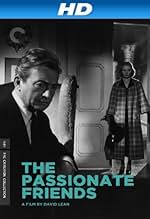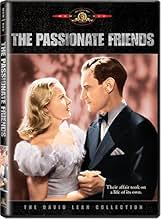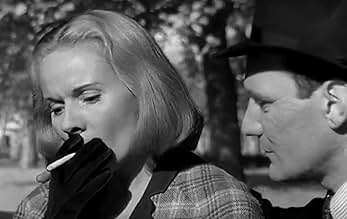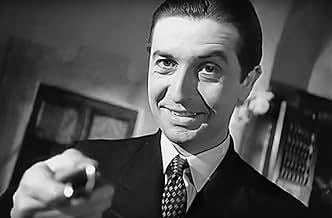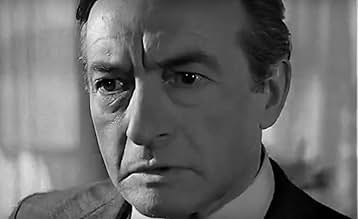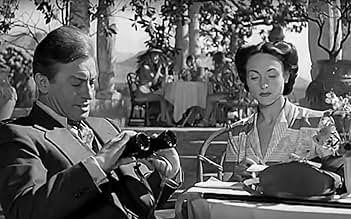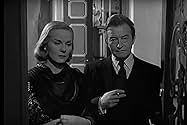NOTE IMDb
7,2/10
3,4 k
MA NOTE
Une femme rencontre un homme dont elle a rejeté l'amour il y a des années.Une femme rencontre un homme dont elle a rejeté l'amour il y a des années.Une femme rencontre un homme dont elle a rejeté l'amour il y a des années.
- Réalisation
- Scénario
- Casting principal
- Récompenses
- 2 victoires et 1 nomination au total
Hélène Burls
- Flowerwoman
- (non crédité)
Amy Dalby
- Lady on Underground
- (non crédité)
Lisa Daniely
- Cinema Usherette
- (non crédité)
Max Earle
- Third Man - Albert Hall
- (non crédité)
Edward Evans
- Underground ticket officer
- (non crédité)
Arthur Howard
- Smith - Butler
- (non crédité)
John Huson
- First Man - Albert Hall
- (non crédité)
Wilfrid Hyde-White
- Lawyer
- (non crédité)
Charles Lloyd Pack
- Man Drinking with Stratton
- (non crédité)
Guido Lorraine
- Hotel Manager
- (non crédité)
Ina Pelly
- Second Woman - Albert Hall
- (non crédité)
Helen Piers
- First Woman - Albert Hall
- (non crédité)
Marcel Poncin
- Hall Porter
- (non crédité)
Avis à la une
H. G. Wells wrote his novel in 1913 and it was first filmed by Maurice Elvey in 1922. By all accounts David Lean was reluctant to take it on and did so only as a favour to Ronald Neame. Once he agreed to do it however nothing less that the very best would do. Although Eric Ambler is credited with the screenplay, he was aided considerably by Lean and Stanley Haynes. Ann Todd with whom Lean had initial 'temperament' problems and Trevor Howard are both superb as the lovers. Howard replaced Marius Goring who would not have suited. Lean had a habit in his films of sometimes making an actor in the cast feel 'left out'. In this case the victim was Howard. The film actually belongs to Claude Rains for whom Lean had the deepest admiration. His portrayal of the betrayed husband is consummate and a masterclass in great film acting. Lean's own verdict on the film? 'Very nearly very good but a little cold'. I feel he was being unduly harsh on himself as anyone who is left unmoved by the final scene has a heart of stone. The film was criticised at the time for its extensive use of flashbacks. Ones heart goes out to those poor souls in the audience who get so easily confused! Lean's mastery of the visual, his 'cutter's' instinct and the excellent performances make this an absorbing and immensely satisfying film.
It's easy to associate "The Passionate Friends" to its detriment with "Brief Encounter"; in its voice-over/flashback structure, in its themes of suicide and adultery, and of course in the casting of Trevor Howard. But in a sense -- although not, unfortunately, an entirely successful one -- in a sense, the later film is an attempt to do something very different with this source material. At the most basic level the two pictures have virtually nothing in common: "Brief Encounter" is a story of renunciation and unselfishness, of ordinary lives in an unromantic setting, of heartbreak from a painfully honest narrator. "The Passionate Friends" (a title never really explained) revolves ultimately around selfishness and self-deception, lavish trappings and a shallow surface gloss epitomised by the cheesy 'Swiss' tourist music that backs the initial establishing shots.
Mary's swelling soft-focus memories of her grand passion are deflated by jarring little jabs from the director, in what I suspect is intended as an alert to the viewer that her romantic-seeming situation is not quite what it seems -- in effect, she is an unreliable narrator, and the pay-off comes when she perceives, finally and appallingly, what she really is and what she has done. It is a climax worth waiting for, but it is slow to arrive; and the subtle wrongness in the love affair, the self-dramatisation and lack of authenticity (whether or not these are deliberate attempts to undermine her presentation of events, as hindsight suggests they may be) until then tend to come across simply as unconvincing story-telling.
It is never clear just what Mary means by her assertion that she wants to belong to herself and not to any lover. By the end, however, it is all too apparent that this mantra, reminiscent of the "Can't tie me down, babe" slogans of the (male) serial shaggers of the Sixties, is every bit as self-indulgent a female pose. She is in love with the idea of being in love: playing at it, day-dreaming transgressions. But when reality strikes, the whole game is exposed as a silly, hugely destructive fantasy.
After the first showdown with her husband (which we are specifically, and with hindsight, significantly, not allowed to witness), she warns Steven that she is not truly a good person to love. We -- and he -- do not then either understand or believe her; but she is right. She is not prepared to give herself, in modern parlance to 'commit': but she will not let go either.
The trouble for me is that for most of its running length the film seems to be simply a somewhat off-kilter account of an adulterous affair, over-ponderous, with clumsy use of music and heavily ironic dialogue. (The cinema audience, young and out for a good time, spent rather more time giggling than I assume the director intended.) The cinematic tricks that are present, such as the abrupt cuts in the taxi scene, the nested flashback structure, or the montage of advertisements in the Tube station reading "Keep Smiling", "Strength" and "Saved", too often seem awkward or labouring the obvious. If the idea was indeed to subtly undermine audience preconceptions, it doesn't really work -- there is no equivalent here to the stunning shift in perception that exists between the opening sequence of "Brief Encounter" and the final unwinding of the flashback.
As the ambiguous Mary, Ann Todd is a strangely elusive presence. The character is at the heart of the plot and has the lion's share of screen time, and yet most of that time it's hard to get a grip on her beyond the superficial. I'm still not sure whether this is an intended result of the acting and/or direction, or a flaw in the film.
Trevor Howard carries off the role of the unfortunate Steven with angular charm and provides the requisite sense of bewildered decency; but as others have rightly remarked, it is Claude Rains, in what might appear a largely peripheral role, who steals the show. Rich, older, physically unprepossessing, and mildly affectionate towards his wife when he can spare a moment from the financial markets, Howard Justin is the face of moneyed security versus the romantic passion promised by Mary's once-and-future lover, and as such represents the trappings of a marriage of convenience rather than an actual human being. But almost from the beginning we are made aware that he is neither unintelligent nor unobservant; later we discover that he is not as complaisant as the other couple have assumed, and finally, that he can be hurt -- and can love -- as deeply as any other man. Over a mere handful of scenes in the course of the film Claude Rains manages to convey more tension and real emotional presence than anyone else, and it is this contribution that makes the final twist both plausible and satisfying.
"The Passionate Friends" is not the great film that I feel it is perhaps trying to be; but it is certainly not an abortive carbon-copy of "Brief Encounter". The resolution of the film is starkly effective and is worth sitting through a glossy and rather uninspired beginning for: as a whole, it can be seen as an honourable failure.
(Edit: for what it's worth, in the month since I saw this film I haven't been able to get it out of my head...)
Mary's swelling soft-focus memories of her grand passion are deflated by jarring little jabs from the director, in what I suspect is intended as an alert to the viewer that her romantic-seeming situation is not quite what it seems -- in effect, she is an unreliable narrator, and the pay-off comes when she perceives, finally and appallingly, what she really is and what she has done. It is a climax worth waiting for, but it is slow to arrive; and the subtle wrongness in the love affair, the self-dramatisation and lack of authenticity (whether or not these are deliberate attempts to undermine her presentation of events, as hindsight suggests they may be) until then tend to come across simply as unconvincing story-telling.
It is never clear just what Mary means by her assertion that she wants to belong to herself and not to any lover. By the end, however, it is all too apparent that this mantra, reminiscent of the "Can't tie me down, babe" slogans of the (male) serial shaggers of the Sixties, is every bit as self-indulgent a female pose. She is in love with the idea of being in love: playing at it, day-dreaming transgressions. But when reality strikes, the whole game is exposed as a silly, hugely destructive fantasy.
After the first showdown with her husband (which we are specifically, and with hindsight, significantly, not allowed to witness), she warns Steven that she is not truly a good person to love. We -- and he -- do not then either understand or believe her; but she is right. She is not prepared to give herself, in modern parlance to 'commit': but she will not let go either.
The trouble for me is that for most of its running length the film seems to be simply a somewhat off-kilter account of an adulterous affair, over-ponderous, with clumsy use of music and heavily ironic dialogue. (The cinema audience, young and out for a good time, spent rather more time giggling than I assume the director intended.) The cinematic tricks that are present, such as the abrupt cuts in the taxi scene, the nested flashback structure, or the montage of advertisements in the Tube station reading "Keep Smiling", "Strength" and "Saved", too often seem awkward or labouring the obvious. If the idea was indeed to subtly undermine audience preconceptions, it doesn't really work -- there is no equivalent here to the stunning shift in perception that exists between the opening sequence of "Brief Encounter" and the final unwinding of the flashback.
As the ambiguous Mary, Ann Todd is a strangely elusive presence. The character is at the heart of the plot and has the lion's share of screen time, and yet most of that time it's hard to get a grip on her beyond the superficial. I'm still not sure whether this is an intended result of the acting and/or direction, or a flaw in the film.
Trevor Howard carries off the role of the unfortunate Steven with angular charm and provides the requisite sense of bewildered decency; but as others have rightly remarked, it is Claude Rains, in what might appear a largely peripheral role, who steals the show. Rich, older, physically unprepossessing, and mildly affectionate towards his wife when he can spare a moment from the financial markets, Howard Justin is the face of moneyed security versus the romantic passion promised by Mary's once-and-future lover, and as such represents the trappings of a marriage of convenience rather than an actual human being. But almost from the beginning we are made aware that he is neither unintelligent nor unobservant; later we discover that he is not as complaisant as the other couple have assumed, and finally, that he can be hurt -- and can love -- as deeply as any other man. Over a mere handful of scenes in the course of the film Claude Rains manages to convey more tension and real emotional presence than anyone else, and it is this contribution that makes the final twist both plausible and satisfying.
"The Passionate Friends" is not the great film that I feel it is perhaps trying to be; but it is certainly not an abortive carbon-copy of "Brief Encounter". The resolution of the film is starkly effective and is worth sitting through a glossy and rather uninspired beginning for: as a whole, it can be seen as an honourable failure.
(Edit: for what it's worth, in the month since I saw this film I haven't been able to get it out of my head...)
I was surprised to learn that the original story for The Passionate Friends was written by H.G. Wells. Someone nowadays we identify with the science fiction genre. Certainly it seems to be what has survived best in English literature.
The original story was written in 1913 so some considerable updating was done to make it 1949 contemporary. Lovers Ann Todd and Trevor Howard had an affair back in the day which was ended when Todd's husband Claude Rains found out.
Eleven years go by and Todd and Howard meet at a mountain ski resort in Switzerland. Howard's now married and moved on, but they spend an innocent afternoon reminiscing. Rains catches them and misinterprets with near tragic results.
Ann Todd may be one of the most beautiful women ever to grace the silver screen. She's probably best known in America for being Gregory Peck's loyal wife in The Paradine Case. No wonder Rains is so jealous.
Trevor Howard is essentially doing the same part for David Lean that first got him stardom in Brief Encounter. In fact the story could almost be what happens to the protagonists in Brief Encounter if they met up again in the future. Claude Rains is always right on the money with his portrayals. There's a lot of what John Barrymore did in Maytime in what Rains does here.
If it were done here in the USA, this would have been labeled a woman's picture. It is in fact a nicely done romantic story.
The original story was written in 1913 so some considerable updating was done to make it 1949 contemporary. Lovers Ann Todd and Trevor Howard had an affair back in the day which was ended when Todd's husband Claude Rains found out.
Eleven years go by and Todd and Howard meet at a mountain ski resort in Switzerland. Howard's now married and moved on, but they spend an innocent afternoon reminiscing. Rains catches them and misinterprets with near tragic results.
Ann Todd may be one of the most beautiful women ever to grace the silver screen. She's probably best known in America for being Gregory Peck's loyal wife in The Paradine Case. No wonder Rains is so jealous.
Trevor Howard is essentially doing the same part for David Lean that first got him stardom in Brief Encounter. In fact the story could almost be what happens to the protagonists in Brief Encounter if they met up again in the future. Claude Rains is always right on the money with his portrayals. There's a lot of what John Barrymore did in Maytime in what Rains does here.
If it were done here in the USA, this would have been labeled a woman's picture. It is in fact a nicely done romantic story.
The Passionate Friends (1949)
You wonder how this movie would be told without the Hays Code (and its British counterpart) hovering over the scriptwriter and director. But here we have David Lean's version of the much older H.G. Wells novel (from just before WWI) with all the restraint of movie romances of the period. That is, without our modern idea of passion.
And that's one of the things that makes this really work. It's not about making love on the sly, or going rapturous on screen. It's about the complicated emotional needs and conflicts of three people. That's what passion boils down to, at least in a way that we want to spend time with. And though this is not a full fledged love triangle like "Jules and Jim" (it's one woman caught between two men), it does play with the clashing and melding of three personalities and their passions.
Oddly, you learn fairly soon that the passion of the older man, played by Claude Rains, is deliberately not passionate. That's not what he wants in love. The younger man (not by much) is played by Trevor Howard and he is a sweetheart, with a family, and yet he still has that pure ideal love for the woman he can't shake. Even though she is married to the older man.
The woman holds it all together, both in the story, since she is involved with both men, and in the movie, played with amazing force and nuance by Ann Todd. When she first appeared on screen, thinking to herself on a plane taking off, I thought she was a little like Joan Fontaine, and since I love Fontaine, I was going to be open to this inferior version. But she wasn't inferior one bit. The longer the movie went on, the more I realized what a deeply felt, complex performance Todd gives. She not only has to be a different kind of woman with each of the men, she has to do so in different time periods over about eight years. Great stuff. I want to watch it again just to appreciate her. She was almost wholly a British actress, not moving to Hollywood, and so she never had an American audience the way some of the more famous stars here naturally did. Too bad for everyone.
The movie, as such, has a little inevitability to it--not that we know how it will end, exactly, but that we know how it will probably end, the one or two main options. The rivalry, the jealousy, the caught looks across a train station, the views from the Italian Villa, all the clichés are here. They are all perfectly handled, for sure, but an edge of originality would have helped a lot. I'm very curious to read the Wells book just to see how complex he makes the woman, and the story. And to check the ending he had in mind in 1913.
Lean, the director, is a legend of course. He made so many really fine films, important ones, it's easy to overlook this one. Even the slightly similar (in feel) "Brief Encounter" from 1945 casts a huge shadow here. Throw in "Lawrence of Arabia," "Dr. Zhivago," "Blithe Spirit," "Bridge over the River ." You get the idea.
See this. Expect nothing sensational, and you'll be sucked into a really superb, conventional, beautiful romantic drama. I just read (and gave a thumbs up) to a long review for this film that seems incredibly perceptive, but which maybe forces too much analysis onto the motives of the players here--especially for someone who hasn't seen it yet. I suggest getting sucked in and taking the advice to be patient, but also forging your own view of the events and hearts involved.
You wonder how this movie would be told without the Hays Code (and its British counterpart) hovering over the scriptwriter and director. But here we have David Lean's version of the much older H.G. Wells novel (from just before WWI) with all the restraint of movie romances of the period. That is, without our modern idea of passion.
And that's one of the things that makes this really work. It's not about making love on the sly, or going rapturous on screen. It's about the complicated emotional needs and conflicts of three people. That's what passion boils down to, at least in a way that we want to spend time with. And though this is not a full fledged love triangle like "Jules and Jim" (it's one woman caught between two men), it does play with the clashing and melding of three personalities and their passions.
Oddly, you learn fairly soon that the passion of the older man, played by Claude Rains, is deliberately not passionate. That's not what he wants in love. The younger man (not by much) is played by Trevor Howard and he is a sweetheart, with a family, and yet he still has that pure ideal love for the woman he can't shake. Even though she is married to the older man.
The woman holds it all together, both in the story, since she is involved with both men, and in the movie, played with amazing force and nuance by Ann Todd. When she first appeared on screen, thinking to herself on a plane taking off, I thought she was a little like Joan Fontaine, and since I love Fontaine, I was going to be open to this inferior version. But she wasn't inferior one bit. The longer the movie went on, the more I realized what a deeply felt, complex performance Todd gives. She not only has to be a different kind of woman with each of the men, she has to do so in different time periods over about eight years. Great stuff. I want to watch it again just to appreciate her. She was almost wholly a British actress, not moving to Hollywood, and so she never had an American audience the way some of the more famous stars here naturally did. Too bad for everyone.
The movie, as such, has a little inevitability to it--not that we know how it will end, exactly, but that we know how it will probably end, the one or two main options. The rivalry, the jealousy, the caught looks across a train station, the views from the Italian Villa, all the clichés are here. They are all perfectly handled, for sure, but an edge of originality would have helped a lot. I'm very curious to read the Wells book just to see how complex he makes the woman, and the story. And to check the ending he had in mind in 1913.
Lean, the director, is a legend of course. He made so many really fine films, important ones, it's easy to overlook this one. Even the slightly similar (in feel) "Brief Encounter" from 1945 casts a huge shadow here. Throw in "Lawrence of Arabia," "Dr. Zhivago," "Blithe Spirit," "Bridge over the River ." You get the idea.
See this. Expect nothing sensational, and you'll be sucked into a really superb, conventional, beautiful romantic drama. I just read (and gave a thumbs up) to a long review for this film that seems incredibly perceptive, but which maybe forces too much analysis onto the motives of the players here--especially for someone who hasn't seen it yet. I suggest getting sucked in and taking the advice to be patient, but also forging your own view of the events and hearts involved.
The Passionate Friends is the first of three films that director David Lean made with Ann Todd in and she gives a fine performance in this mannered British melodrama that evokes in ways two other popular British films of the era, Lean's Brief Encounter and the Todd starring The Seventh Veil.
Former lovers Mary Justin (Todd) and Steven Stratton (Trevor Howard) meet accidentally at a New year's party and rekindle lost feelings. Trouble is she is married to a wealthy banker Howard Justin (Claude Rains) and Stratton's in a committed relationship. Justin discovers the affair however and puts an end to it. Nine years pass and they meet again while vacationing. Stratton is now married with kids but Howard thinks otherwise and files for divorce. Mary becomes desperate and suicidal.
With quality performances (especially Rains) from all of the leads The Passionate Friends is credible melodrama that overachieves with Lean displaying his superb grasp of film language, employing jump cuts, montage and juxtaposition for maximum effect. With a few Hitchcock like flourishes along the way he does an excellent job of keeping the audience guessing right up until the final minutes. It is this subtle triumph of form that makes The Passionate Friends a superior example of its genre.
Former lovers Mary Justin (Todd) and Steven Stratton (Trevor Howard) meet accidentally at a New year's party and rekindle lost feelings. Trouble is she is married to a wealthy banker Howard Justin (Claude Rains) and Stratton's in a committed relationship. Justin discovers the affair however and puts an end to it. Nine years pass and they meet again while vacationing. Stratton is now married with kids but Howard thinks otherwise and files for divorce. Mary becomes desperate and suicidal.
With quality performances (especially Rains) from all of the leads The Passionate Friends is credible melodrama that overachieves with Lean displaying his superb grasp of film language, employing jump cuts, montage and juxtaposition for maximum effect. With a few Hitchcock like flourishes along the way he does an excellent job of keeping the audience guessing right up until the final minutes. It is this subtle triumph of form that makes The Passionate Friends a superior example of its genre.
Le saviez-vous
- AnecdotesThis movie is based on the 1913 novel "The Passionate Friends" by H. G. Wells, who also wrote "The Invisible Man", which was made into a 1933 hit movie starring Claude Rains, one of the stars in this movie.
- GaffesWhen Steven barges into Howard's office, he is shown starting to close the door, followed by the sound of a door closing. However, in the subsequent shot, the door is open again.
- Citations
Mary Justin: I'm not a very good person, Steven. I wanted your love - and I wanted Howard's affection and the security he could give me.
Professor Steven Stratton: I can give you security too, and more than affection.
Mary Justin: You don't really know me at all. My love isn't worth very much.
- ConnexionsFeatured in Discovering Film: Claude Rains (2015)
Meilleurs choix
Connectez-vous pour évaluer et suivre la liste de favoris afin de recevoir des recommandations personnalisées
- How long is The Passionate Friends?Alimenté par Alexa
Détails
- Date de sortie
- Pays d’origine
- Langues
- Aussi connu sous le nom de
- Apasionada
- Lieux de tournage
- Le Brévent, Chamonix, Haute-Savoie, France(cable car outing at Brévent in front of Pic du Midi)
- Société de production
- Voir plus de crédits d'entreprise sur IMDbPro
Box-office
- Montant brut mondial
- 40 335 $US
- Durée1 heure 35 minutes
- Couleur
- Rapport de forme
- 1.37 : 1
Contribuer à cette page
Suggérer une modification ou ajouter du contenu manquant


